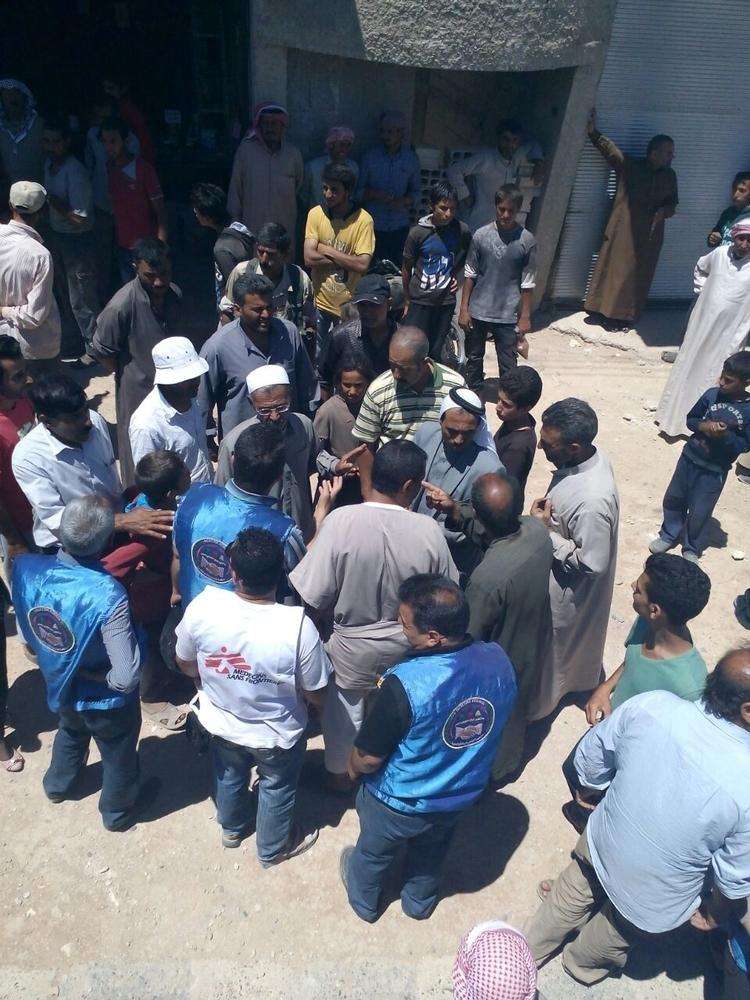As frontlines continue to shift and the Syrian Democratic Forces (SDF) armed group continues to mount an offensive on the city of Menbij, growing numbers of civilians are fleeing their home towns towards the areas surrounding the Euphrates River. Both internally displaced Syrians and host communities in the region are in urgent need of humanitarian assistance.
The dire situation, together with an overall collapse of the Syrian health system, raises fears of a further increase in preventable childhood diseases, said the international humanitarian aid organization Doctors Without Borders/Médecins Sans Frontières (MSF).
"There are no doctors and we don’t have access to food," said a 51-year-old from the northeast of Abu Qalgal. "We cannot move freely here. All people are afraid. I dream about going back and [living] with my family safely in my village. Once I’m back I’ll never leave it again, but unfortunately that can only happen when we are not being attacked again and again."
An Urgent Need for Vaccinations
In May, 23 children suspected of having measles reported to the local health center in Sarrin, northeast of Aleppo. All were from communities living in conflict-affected areas close to newly formed frontlines, where vaccination rates and access to health care remain fragile.
"Measles is highly infectious and outbreaks occur where health systems and routine childhood vaccination [are] absent or insufficient," said Vanessa Cramond, MSF medical emergency manager. "Younger children are particularly vulnerable to measles, especially when complicated by malnutrition or other illnesses."
Another Looming Health Crisis
To help stem the risk of infection spreading, MSF scaled up support to local health authorities in northern Syria, who were implementing a ring vaccination campaign east of the Euphrates River, in northeastern Aleppo Governorate. The campaign rapidly vaccinated 2,784 children for measles in communities that are suffering from the consequences of war and ongoing ground offensives.
Local health response teams simultaneously conducted an emergency food distribution and screened all children who passed through the vaccination campaign for acute malnutrition.
Nine children with severe acute malnutrition were identified and received urgent medical care, while 30 more with moderate acute malnutrition received nutritional treatment.
"It was not safe in Menbij, so we decided to run away with our five children. First we took a motorbike together with the children, but for the last part of the journey, we were forced to walk. We were lucky to make it here. The main challenges here are getting food and medical care. There is only one private pharmacy with some drugs, but there is no doctor. But we need vaccinations for our children."
—A 27-year-old internally displaced woman in Menbij
Almost six years into the conflict in Syria, families and communities both in the direct path of the fighting and far behind frontlines continue to experience outbreaks of disease and difficulty accessing care for chronic conditions such as diabetes, epilepsy, heart disease, and other previously treatable illnesses. Without increased access to medical care the population’s health will continue to decline.
Since March 2015, MSF has worked alongside the Kobane Health Administration to re-establish basic health facilities, provide outpatient health services, re-introduce vaccination services, and create psychosocial support programs. MSF is currently assisting the health administration in opening a new 36-bed hospital in Kobane town and eight health clinics in surrounding areas.




